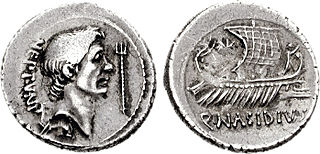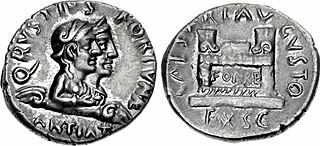Related Research Articles
The gens Afrania was a plebeian family at Rome, which is first mentioned in the second century BC. The first member of this gens to achieve prominence was Gaius Afranius Stellio, who became praetor in 185 BC.
The gens Cluvia was a plebeian family at Ancient Rome, known from the later Republic, and early imperial times. The first member of the gens to achieve prominence was Gaius Cluvius Saxula, praetor in 175 and 173 BC.
The gens Sedatia, occasionally written Sedata, was a plebeian family at ancient Rome, which flourished from the first to the third century. The only member of this gens known to have held a seat in the Roman senate was Marcus Sedatius Severianus, consul suffectus in AD 153.
The gens Poppaea was a minor plebeian family at Rome. Members of this gens first appear under the early Empire, when two brothers served as consuls in AD 9. The Roman empress Poppaea Sabina was a descendant of this family, but few others achieved any prominence in the Roman state. A number of Poppaei are known from inscriptions. The name is sometimes confused with that of Pompeia.

The gens Nasidia was an obscure plebeian family at Rome. The gens is best known from Quintus Nasidius, one of the admirals of Gnaeus Pompeius Magnus during the Civil War. Although none of the Nasidii are known to have held any of the higher offices of the Roman state, a number are known from inscriptions. A coin of this gens depicts the head of Pompeius and a trident on the obverse, and on the reverse a ship, with the inscription Q. Nasidius.
The gens Opellia, also spelled Opelia and Opilia, was a minor family of imperial Rome, which briefly emerged from obscurity when Marcus Opellius Macrinus was proclaimed emperor following the murder of Caracalla in AD 217. The only members of this gens who appear in history are the emperor and his son, Marcus Opellius Diadumenianus, who ruled briefly as co-emperor in 218, but other Opellii are found in inscriptions, particularly from Dacia.
The gens Petreia was a minor plebeian family at ancient Rome. Members of this gens are first mentioned toward the end of the second century BC, and several were distinguished as soldiers, but none of them ever attained the consulship.
The gens Pleminia was a minor plebeian family at ancient Rome. The only member of this gens mentioned in history is Quintus Pleminius, infamous for his outrageous conduct at Locri during the Second Punic War. Other Pleminii are known from inscriptions.
The gens Racilia was a minor plebeian family at ancient Rome. Members of this gens are mentioned as early as the fifth century BC, but few of them achieved any prominence in the Roman state.
The gens Rubellia was a minor plebeian family at ancient Rome. Members of this gens are first mentioned in the time of Augustus, and they achieved prominence during the first century, when two of them obtained the consulship: Gaius Rubellius Blandus in AD 18, and Lucius Rubellius Geminus in AD 29.
The gens Rubria was a plebeian family at ancient Rome. Members of this gens are first mentioned in the time of the Gracchi, but they did not rise to prominence until imperial times. The first of the Rubrii to obtain the consulship was Rubrius Gallus, some time before AD 68.

The gens Rustia was a minor plebeian family at ancient Rome. Members of this gens are first mentioned toward the end of the Republic, and a few of them achieved prominence in imperial times, with Titus Rustius Nummius Gallus attaining the consulship under Tiberius in AD 34.
The gens Salvidiena was a plebeian family at ancient Rome. Members of this gens are first mentioned toward the end of the Republic, and from then to the end of the second century they regularly filled the highest offices of the Roman state.

The gens Sanquinia was a minor plebeian family at ancient Rome, which rose out of obscurity in imperial times to attain the highest offices of the Roman state. Members of this gens are first mentioned in the time of Augustus, and Quintus Sanquinius Maximus held the consulship under Tiberius and Caligula. The family vanishes from history in the time of Claudius.
The gens Silia was a plebeian family at ancient Rome. Members of this gens are mentioned as early as the fifth century BC, but first to hold the consulship was Publius Silius Nerva, in the time of Augustus. The Silii remained prominent until the time of the Severan dynasty, in the early third century.
The gens Spurinnia was a minor plebeian family of Etruscan descent at ancient Rome. No members of this gens are mentioned in ancient writers, but several are known from inscriptions.
The gens Subria was an obscure plebeian family at ancient Rome. Few members of this gens are mentioned in history, but others are known from inscriptions.
The gens Suedia was an obscure plebeian family at ancient Rome. Few members of this gens are mentioned by ancient historians, but others are known from inscriptions.
The gens Suillia, occasionally written Suilia, was a minor plebeian family at ancient Rome. Members of this gens are first mentioned under the early Empire. The first of the Suillii to obtain the consulship was Publius Suillius Rufus, early in the reign of Claudius.
The gens Suetonia was a minor plebeian family at ancient Rome. Members of this gens are first mentioned in the reign of Claudius, under whom the general Gaius Suetonius Paulinus, consul in AD 66, won his first military victories; but the family is perhaps best known for the historian Gaius Suetonius Tranquillus, who flourished toward the beginning of the second century.
References
- ↑ Chase, p. 126.
- ↑ New College Latin and English Dictionary, s.v. surdus.
- ↑ Chase, pp. 109, 110.
- ↑ CIL VIII, 1223.
- ↑ PW, Surdinia.
- ↑ PIR, S. 748.
- ↑ CIL V, 6104.
- ↑ AE 1985, 485.
- ↑ Cassius Dio, lx. 29 (Earnest Cary, trans.).
- ↑ Dictionary of Greek and Roman Biography and Mythology, vol. II, p. 229 ("Surdinius Gallus").
- ↑ PW, Surdinius Gallus.
- ↑ PIR, S. 747.
- ↑ CIL VIII, 5860.
- ↑ CIL X, 3634.